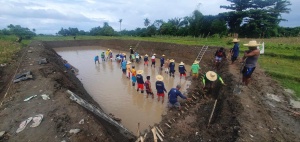
In response to the looming impact of the El Niño phenomenon in 2024, the Department of Social Welfare and Development (DSWD) is closely working with the Department of Agriculture (DA) and the United Nations – World Food Program (UN-WFP) for the pilot implementation of Project LAWA or the Local Adaptation to Water Access in selected municipalities in the archipelago.
Officially launched on August 31, Project LAWA is an initiative of the DSWD, through the Disaster Response Management Bureau (DRMB), that aims to provide a sustainable solution and proactive intervention that will address the challenges faced by poor communities during periods of severe drought, ultimately mitigating the threat of water scarcity.
DSWD Secretary Rex Gatchalian said Project LAWA is designed to comprehensively address the detrimental consequences and impacts of El Niño.
“The DSWD is committed to strengthen communities against the challenges posed by El Niño by providing a timely and strategic response to mitigate its potential adverse effects. This initiative aligns with the government’s commitment to fostering early actions that contribute to long-term resilience and sustainability in the face of climate-related challenges,” Sec. Gatchalian explained.
Project LAWA’s framework focused on the construction of small farm reservoirs strategically placed in selected towns over a period of 15 days.
Each reservoir is constructed within a 20 by 25-square meter area with a maximum depth of 50 feet. These reservoirs are intended to serve as vital water sources for communities during periods of drought or dry spells.
The initial phase of the project’s implementation was carried out in the municipalities of Aguinaldo, Alfonso, and Hungduan in Ifugao province (Luzon); Sebaste, Barbaza, and Sibalom in Antique province (Visayas); and Laak, Monkayo, and Compostela in Davao de Oro province (Mindanao).
The strategic locations were specifically chosen based on the severity of the expected impact of El Niño in these areas.
Empowering Communities
“Aside from mitigating the effects of the El Niño, Project LAWA aims to empower community members by providing temporary income support through cash-for-training and work modalities in return for labor and skills development,” the Secretary pointed out.
The funding for the cash-for-training and work program for the project’s beneficiaries falls under the responsibility of the DSWD, which also spearheaded the overall implementation of the initiative.
The DSWD partnered with local government units (LGUs) to engage 50 workers in constructing small farm reservoir (SFR) or water harvesting facilities for a period of 15 days.
The chosen participants were compensated with 100% of the regional minimum daily wage rate ranging from Php400 to Php450 a day, totaling Php6,000 to Php6,750 for the entire project duration.
Preference for employment opportunities were given to those listed in DSWD’s Listahanan database, farmers, fisherfolk, indigenous peoples, recipients of the Risk Resiliency Program (RRP), and other vulnerable sectors impacted by El Niño.
On the other hand, the Department of Agriculture provided crucial technical guidance and criteria for the selection of small farm reservoir locations in the selected municipalities.
For the part of the UN-WFP, the organization supplied the essential tools to the beneficiaries such as shovels, pickaxes, galvanized iron (G.I.) buckets, gloves, and paddy boots to help facilitate the groundwork required for the success of the project.
“The DSWD believes that by engaging participants in Project LAWA, both water and food security challenges will be addressed since social safety nets will be in place in anticipation of the impact of the El Niño phenomenon,” Sec. Gatchalian said.#


